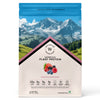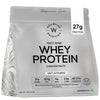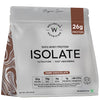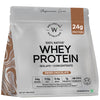If you’ve ever looked into nutrition, muscle recovery, or fitness supplements, you’ve probably heard about amino acids. They’re often called the "building blocks of protein," but what does that mean? More importantly, why should you care? Whether you're a fitness enthusiast, an athlete, or someone looking to improve your overall health, understanding essential amino acids (EAAs) can make a huge difference in your diet and performance.
In this guide, we’ll break down what essential amino acids are, why they matter, and the best food sources to include in your diet—especially for those following an Indian diet.
What Are Essential Amino Acids?
Amino acids are organic compounds that help build proteins in the body. There are 20 different amino acids, and they fall into two main categories:
-
Essential Amino Acids (EAAs) – The body cannot produce these on its own, so you must get them from food or supplements. There are nine essential amino acids:
-
Histidine
-
Isoleucine
-
Leucine
-
Lysine
-
Methionine
-
Phenylalanine
-
Threonine
-
Tryptophan
-
Valine
-
Non-Essential Amino Acids – The body can produce these on its own, even if you don’t get them from food.
Essential amino acids play a vital role in muscle growth, immune function, energy production, and overall well-being.
Benefits of Essential Amino Acids
1. Supports Muscle Growth and Recovery
Essential amino acids, especially leucine, isoleucine, and valine (also known as BCAAs or Branched-chain amino acids), help stimulate muscle protein synthesis. This makes them crucial for those who exercise regularly, as they aid in muscle repair and recovery after workouts.
2. Boosts Energy Levels
Amino acids help in the production of enzymes and neurotransmitters that keep you active and focused. If you often feel fatigued, ensuring you get enough EAAs can make a noticeable difference in your energy levels.
3. Aids in Metabolism and Fat Loss
Amino acids like methionine play a role in fat metabolism and liver function. Getting enough EAAs helps maintain a healthy metabolism, which is essential for weight management.
4. Strengthens the Immune System
Lysine and histidine are essential for proper immune function. They help produce antibodies and enzymes that protect the body from infections and illnesses.
5. Improves Mood and Sleep
Tryptophan is a precursor to serotonin, a neurotransmitter that regulates mood, stress, and sleep. A diet rich in EAAs can help promote better sleep and emotional well-being.
Best Food Sources of Essential Amino Acids
Since the body can't produce EAAs, it's crucial to get them through diet. Here are some of the best sources:
Animal-Based Sources
-
Eggs – A complete source of protein with all nine EAAs
-
Chicken and Fish – High in leucine, essential for muscle-building
-
Dairy Products (Milk, Paneer, Yogurt) – Excellent for muscle recovery and bone health
Plant-Based Sources (Vegetarian & Vegan Options)
For those following a vegetarian or vegan diet, combining different plant-based foods ensures you get all EAAs:
-
Quinoa – One of the few plant foods with all nine EAAs
-
Soy Products (Tofu, Tempeh, Soy Milk) – Great for vegetarians looking to boost protein intake
-
Lentils and Legumes (Dal, Chickpeas, Kidney Beans) – Combine with rice for a complete protein
-
Nuts and Seeds (Chia Seeds, Flaxseeds, Almonds, Peanuts) – A good mix of amino acids and healthy fats
Should You Consider Essential Amino Acid Supplements?
While whole foods should always be the primary source of nutrients, supplements can be beneficial for those who struggle to get enough EAAs from their diet. Athletes, bodybuilders, or those on restrictive diets (like vegans) may benefit from EAA powders or BCAA supplements to support muscle recovery and performance.
Essential amino acids are crucial for muscle growth, recovery, metabolism, and overall health. Whether you’re an athlete or just trying to stay fit, ensuring your diet includes enough EAAs can help you feel more energetic and support long-term wellness. Prioritize protein-rich foods, experiment with plant-based sources if needed, and supplement wisely if your diet lacks essential nutrients.































